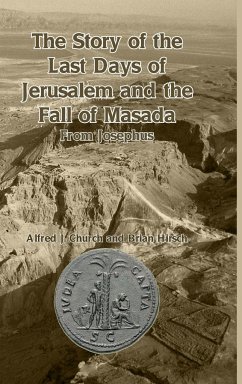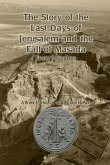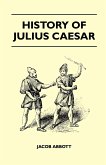"For those seeking a heroic story, an expression of idealism, self-sacrifice, and resistance against tyranny, the story of the fall of Jerusalem and Masada remain two of history's epic events." - from the new introduction. A dramatic and engrossing English prose retelling of the story of two pivotal events on Jewish history-the sieges of Jerusalem and Masada during the Roman-Jewish War (66-73 CE)-drawn directly from the Latin original written by the famous historian Flavius Josephus. Josephus-a Jewish rebel leader captured and "turned" by the Romans, is the only historian to have recorded in detail the events surrounding these two earthshaking events. The first part, prepared by famous English historian Alfred J. Church, deals with the events leading up to the siege and fall of Jerusalem, and the second part, newly prepared by New York scholar Brian Hirsch, deals with the events immediately afterward, including the siege and fall of Masada. The Great Jewish Revolt had its origins in protests against Roman taxation. After the Romans responded to the unrest by looting the Temple in Jerusalem, a full-scale uprising broke out, which led to the massacre of both the Roman garrison and a legion dispatched from Syria. After the Roman-appointed King Herod was forced to flee, a Jewish government was established. Wracked by internal dissension, and facing a mighty foe, the Jewish forces fought desperately to defend their newly-established state-but in vain. Under the command of Vespasian, then his son Titus, and finally the legate General Silva, Roman forces overcame the Jewish strongholds one by one. Finally, only two major strongholds remained: Jerusalem, held by the Sadducee Jerusalemites and the Zealots, and the mountaintop fortress of Masada, held by the Sicarii. It took the Romans more than a year to overcome the defenses of Jerusalem and Masada. Jerusalem was razed to the ground, and its inhabitants massacred. At Masada, the Romans built a mighty ramp up the mountain, only to be greeted by the sight of the mass suicide of the 960 defenders. Contents Preface by Alfred J Church Preface by Brian Hirsch PART I: THE FALL OF JERUSALEM Chapter I: Of the Beginnings of the Jewish War Chapter II: Of the Doings of Cestius Chapter III: Of Josephus and the Besieging of Jotapata Chapter IV: Of the Marvellous Escape of Josephus, and of the War in Galilee Chapter V: Of the Troubles in Jerusalem Chapter VI: Of the First Coming of the Romans Chapter VII: The Beginning of the Siege Chapter VIII: Of the Walls of Jerusalem Chapter IX: The Siege Chapter X: The Siege (Continued) Chapter XI: The Siege (Continued) Chapter XII: The Taking of the City Chapter XIII: The End PART II: THE ROAD TO MASADA Chapter I: Aftermath of the Fall of Jerusalem Chapter II: The Siege of Macherus Chapter III: Concerning the Fortress of Masada Chapter IV: Concerning the Sicarii and their Occupation of Masada Chapter V: The Romans Lay Siege to Masada Chapter VI: Eleazar's Speech to the Defenders of Masada Chapter VII: The Mass Suicide at Masada Chapter VIII: The End of the War
Hinweis: Dieser Artikel kann nur an eine deutsche Lieferadresse ausgeliefert werden.
Hinweis: Dieser Artikel kann nur an eine deutsche Lieferadresse ausgeliefert werden.








